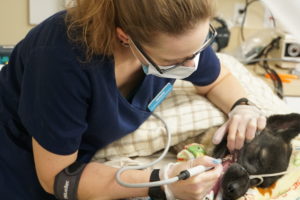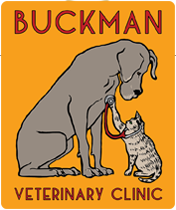Dental Services
Dental disease is very common in pets. Most will experience significant tooth and gum disease in their lifetime. Since many dental problems slowly worsen over time it can be hard to realize an issue is brewing. Painful gums and chronic inflammation often make pets seem quieter or grumpier, but it is hard to differentiate this from aging or behavioral changes until we treat the problem and watch them improve.
Keeping a pet’s mouth healthy and pain-free requires a combination of home care and in-clinic treatment. Just like people, the degree of involvement depends on the individual. Some pets are blessed with strong teeth and gums with perfect spacing and will only need basic maintenance care. Some pets either through genetics, injury, or prior inadequate care have greater dental challenges. Our goal is to partner with you to provide practical treatment and home care options tailored to their needs and personality.
Home Care
Home care involves choosing a combination of diet, chews, tooth brushing, and treatments that remove plaque (the bacterial slime layer that causes periodontal disease). Removing tartar (the mineral deposits on teeth) is also helpful, since this harbors plaque. However, it is really the bacterial plaque layer that is always forming that causes the biggest problems. Products or treatments that only remove the visible tartar without slowing plaque development are largely cosmetic, not therapeutic. Most of the products on the market have no actual evidence that they help with plaque or tartar. Also, some hard chews can actually damage pets’ teeth by causing dental fractures. At Buckman Veterinary Clinic, we carry the best dental health products that have been scientifically demonstrated to be effective and safe. We will work with you to find ones suited for your pet and can help teach you how to brush your pet’s teeth.
Professional Dental Care
 Even with excellent home care, most pets’ mouths will require periodic professional attention. At our hospital, this involves thorough cleaning, polishing, and assessment of their entire mouth including dental charting and radiographs. Cleaning the surface of teeth without including the pockets under the gums or x-rays to look for problems in the roots may make your pet’s mouth look cleaner, but are not actually improving their health or removing sources of discomfort. This is why anesthesia is needed for proper pet dentistry. During your pet’s checkup, we will examine them and test a blood sample to make sure they do not have any health problems that may require adjustments to anesthesia. Depending on your pet’s age and medical history additional tests may also be needed. On the day of their procedure, they will stay with us for the day and receive detailed care before, during, and after. We will let you know if any problem teeth are found and how we recommend to treat them. Generally, any additional treatments can be done at the same time. When they head home, we will supply you with details of what we found and our recommendations for the future.
Even with excellent home care, most pets’ mouths will require periodic professional attention. At our hospital, this involves thorough cleaning, polishing, and assessment of their entire mouth including dental charting and radiographs. Cleaning the surface of teeth without including the pockets under the gums or x-rays to look for problems in the roots may make your pet’s mouth look cleaner, but are not actually improving their health or removing sources of discomfort. This is why anesthesia is needed for proper pet dentistry. During your pet’s checkup, we will examine them and test a blood sample to make sure they do not have any health problems that may require adjustments to anesthesia. Depending on your pet’s age and medical history additional tests may also be needed. On the day of their procedure, they will stay with us for the day and receive detailed care before, during, and after. We will let you know if any problem teeth are found and how we recommend to treat them. Generally, any additional treatments can be done at the same time. When they head home, we will supply you with details of what we found and our recommendations for the future.
Regular professional dental cleaning with dental radiographs to look for problems under the gums are an important part of keeping pets’ mouths healthy.
